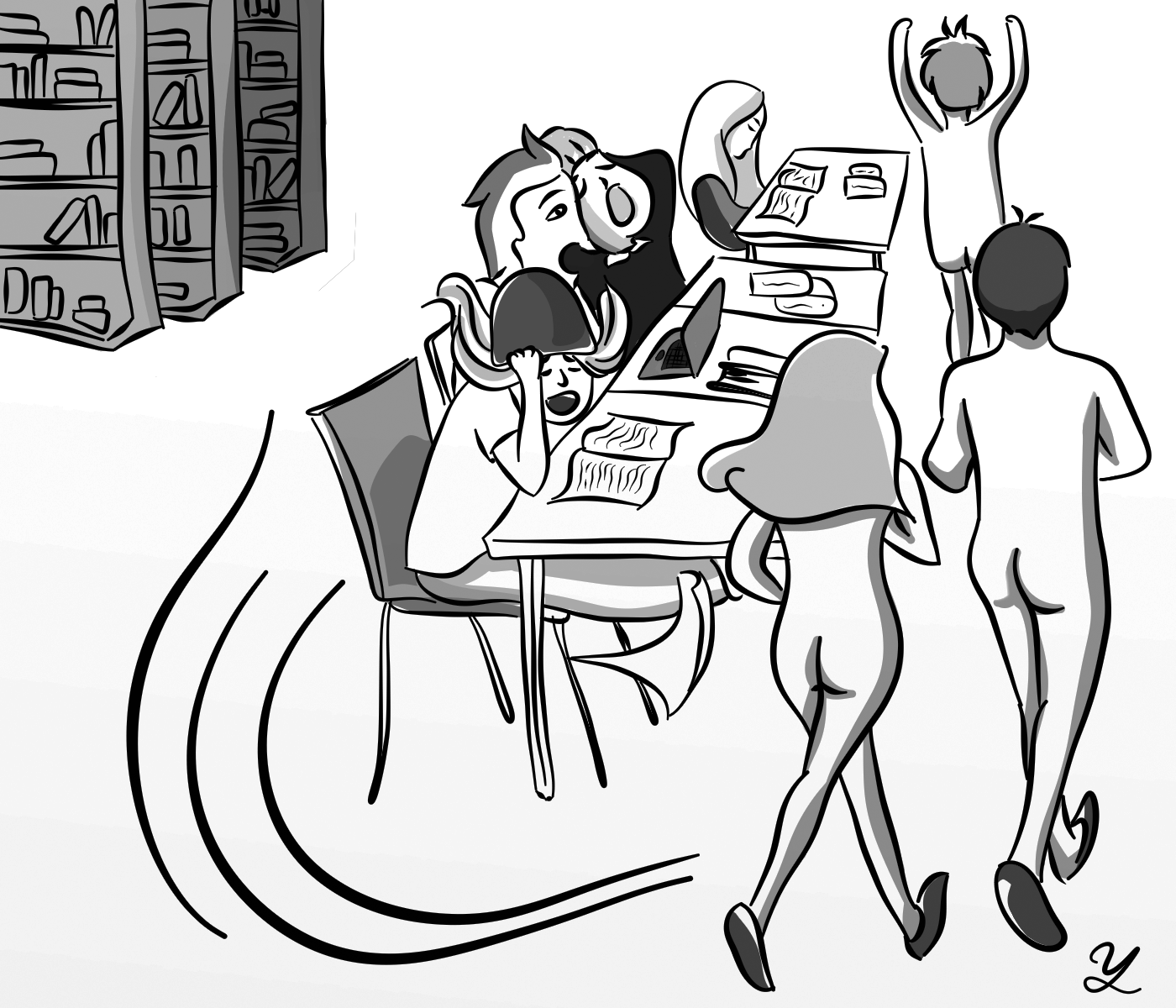
At 11:30 p.m. on the night of Wednesday, Dec. 16, 2015, I was sexually harassed by members of Yale’s student body.
Statements of this nature are by now heartbreakingly familiar on Yale’s campus, and most students know all too well how ubiquitous sexual harassment is among us. But perhaps most students would be stunned to hear that the above statement describes my experience of the Bass Strip (also referred to as the Naked Run), a long-standing and beloved Yale tradition.
In 2002, Will Sullivan wrote of the Bass Strip, “Perhaps the most bizarre thing about the event, however, is not the pure spectacle of naked students … It’s that hardly anyone gives them a second glance.” (“We like getting naked,” Dec. 11) In that article, a participant in the Bass Strip noted that Yale students were “unshockable.” These descriptions seem like a far cry from the gleefully indecent festivities that Yalies know today. Now, large throngs of people wait at the foot of the stairs in anticipation of the naked runners and late-night Bass occupants hoot, holler and catcall as clusters of nude students streak past.
My own reaction to the Bass Strip was anything but indifferent. Having received no prior warning that the nude run was set to happen that night, I was leaving the L&B Reading Room in Sterling when I was unexpectedly confronted by the sight of three completely nude men running straight toward me, screaming, “Embrace it!” Terrified and shocked, I instinctively flattened myself against the nearest wall as they approached, pelting me with pieces of hard candy. It was only after they had disappeared that I realized that they must have been taking part in the Bass Strip. Somehow, arriving at that conclusion did little to stop me from trembling for a long time afterward.
Like most beloved college rituals, the Bass Strip profits from the subversion of traditionally offensive behavior. Its desired effect of shock relies on disrupting a public space with flaunted nudity, which is considered taboo in our society. Perhaps for many at Yale, nudity is not a strong taboo, especially under the Western liberal status quo for sexuality, which might account for the observed reactions of both indifference and celebration to the Bass Strip. However, public nudity is a particularly serious taboo due to its undeniable cultural associations with sex. The event, though it might be amusing or titillating for some, inherently discriminates against others. Students from more sexually conservative cultures, survivors of sexual assault — especially those who may see their assaulter in the crowd — or those who simply don’t want to see other people’s genitals in an unsought context are all likely to be punished by the Bass Strip. The invasive nature of the event irresponsibly demands that potentially unwilling bystanders become participants in an act of a sexual nature without explicit individual consent.
It should be disturbing that the Bass Strip goes on unquestioned, semester after semester, even at a time when sexual harassment on campus is being brought forth as one of Yale’s most pressing issues — only months after the release of the AAU survey results. I am appalled that the underlying assumption of the Bass Strip seems to be that my presence — however accidental, however unintentional — qualifies as consent. Or worse: that my consent is not a factor whatsoever.
Perhaps, then, a well-publicized warning is all that’s needed to rectify the issue of the Bass Strip, to ensure that those who would wish to avoid it have ample opportunity to do so.
To believe that, however, would be to place an unfair and problematic burden on those who do not subscribe to the liberal sexual mores that permeate most of Yale. The reality on campus is that with regard to students’ comfort, many spaces operate according to a zero-sum calculus. During the Strip, for instance, Bass accommodates those who wish to publically display themselves naked, at the direct expense of those who are uncomfortable with seeing nudity. The possibility that the Bass Strip could cause an unknowing individual to be guilty of “being in Bass at the wrong time” operates along the same repugnant logic that could fault a victim of sexual harassment of being present at a party. No one should be forced to leave a space to accommodate others, especially a library which people should reasonably expect to be able to occupy undisturbed. Our campus default should not require that I leave a space because I don’t wish to have someone’s exposed genitals shoved in front of me.
But maybe I am overreacting. After all, public nudity has been, in Sullivan’s words, “an important aspect of the Yale experience for many students.” Who am I to deprive people of such a fundamentally significant experience?
Perhaps, as is the appropriate response to offensive material at Yale, I should have just looked away.
Sherry Lee is a sophomore in Ezra Stiles College. Her column runs on alternate Tuesdays. Contact her at chia.lee@yale.edu .







